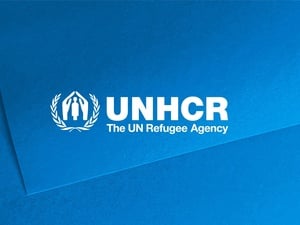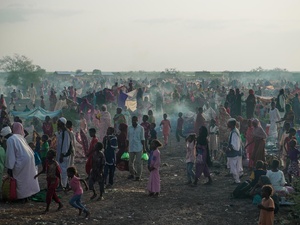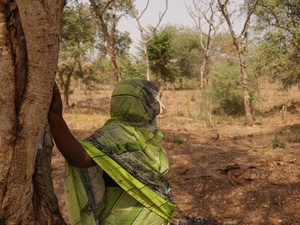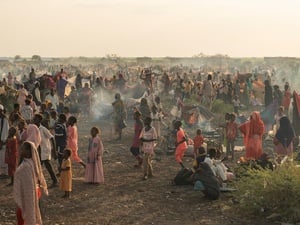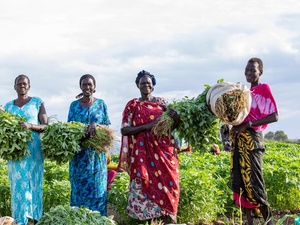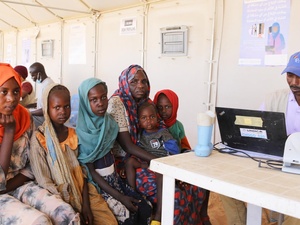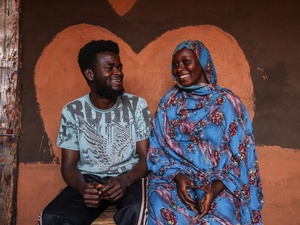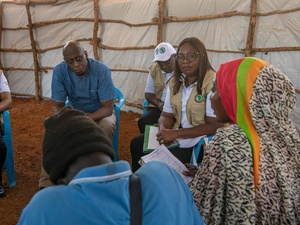Darfur: returnees reporting continuing insecurity; UNHCR launches revised funding appeal
Darfur: returnees reporting continuing insecurity; UNHCR launches revised funding appeal
A UNHCR team dispatched to the village of Saleah in West Darfur last weekend has confirmed the presence in the area of more than 500 families who had been in the border area of Chad and returned to Darfur since July. Smaller numbers are also reported as returning every week. However, returnees and the displaced people in Saleah, Kondebe and Sirba villages told our team that despite some improvement in security since the height of the conflict, they remain afraid to go more than a few kilometres outside of the settlements because of ongoing incidents and attacks.
The returnee families originally fled to Chad from villages in the Saleah area, but have now returned to a makeshift camp on the outskirts of Saleah village. Some of the families said they had been offered the opportunity to go to one of UNHCR's camps inside Chad, but they preferred to return to their own country. The families reportedly returned from the Chad border zone because they had heard that security was improving and that assistance was being distributed inside Darfur. They also wanted to be closer to their family members still in Darfur. However, upon return they were disappointed to find these conditions were not in place. Some people coming from the Chad border tried to return to their villages of origin, but say they were attacked and so returned to the makeshift displaced persons camp. The team also heard that as many as 180 more families may have come back from Chad to three other villages in the area, but was unable to confirm the reports on this mission.
The team also visited displaced people around Sirba and Kondebe villages and verified that there are currently no returns from Chad to these villages. In Sirba, the original population of some 1,200 people has swelled to around 7,000 due to the influx of displaced people. Kondebe hosts more than 5,600 IDPs, and displaced people are still arriving there reportedly due to threats by the Janjaweed militia.
In all three villages, the displaced people and the returnees from Chad told our team they are afraid to go more than a few kilometres outside of the settlements because of continuing insecurity. While they indicated that there has been a slight improvement in security, they reported ongoing incidents such as livestock theft, physical assault, rape, killings, and attacks on villages by the Janjaweed militia. Some of the community leaders reported that because of the continued incidents, even those who have recently returned from Chad are considering fleeing again across the border. However, the authorities have recently increased security efforts in the area, deploying additional police personnel and vehicles. The police force in the villages had increased from some 15 to around 100 police officers in each village.
The living conditions for the displaced people are extremely poor, with no clean water, adequate shelter or sanitation facilities. In Saleah, people are surviving mainly on spinach-like grass which they gather from the surrounding area. The recent returnees from Chad face even tougher conditions, because they missed the registration by WFP [World Food Programme] for food distribution, and the few resources in the immediate area for shelter and food were already strained by the time the families arrived.
Meanwhile, UNHCR today is launching a revised funding appeal for its operations in Darfur and for refugees from Darfur in eastern Chad. The total revised budget is $114.8 million, and includes the increased budget for eastern Chad released last week in the UN's Consolidated Appeal for Chad. In all, UNHCR is seeking $104.8 million for eastern Chad, up from its previous budget of $55.8 million. The funds will allow the agency to continue its relocation operation to move refugees from the volatile border zone into camps, to improve living conditions for refugees in the existing camps and to prepare for a possible additional influx of up to 100,000 new refugees. In Darfur, UNHCR is seeking $9.1 million. The funds will be used to assist Sudanese refugees who have returned or who may return from Chad, to participate in the UN-wide effort to protect and assist internally displaced people in Darfur, and to continue protection activities for some 3,500 Chadian refugees in Darfur who wish to return to Chad. While conditions are not currently conducive for the return of refugees or displaced people, UNHCR will also seek to lay the groundwork for eventual return when the political and security environment permits. To date, UNHCR has received $44 million in contributions for eastern Chad, in addition to $10 million allocated to eastern Chad from the agency's operational reserve. For Darfur, UNHCR has received just over $1.1 million in contributions.


